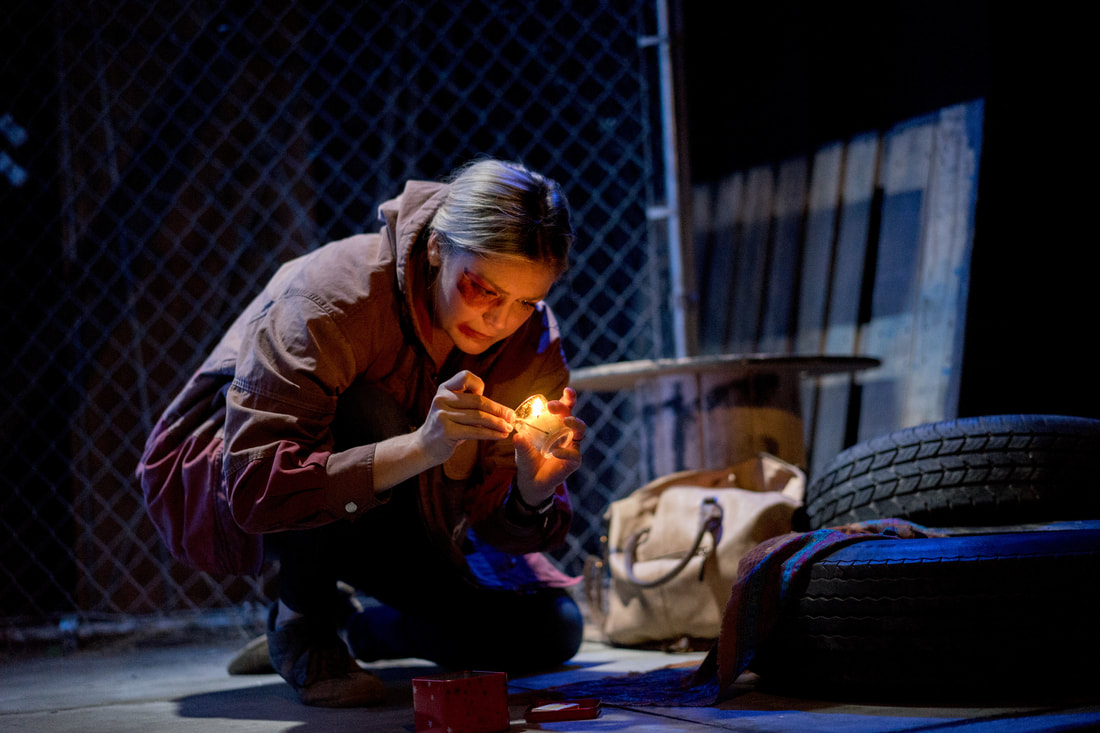|
Jacque Wilke in "Ironbound." Photo by Daren Scott At one point amid the crushing drama and disappointment of Polish immigrant Darja’s life in a New Jersey at its seediest, she confides: “I’m not someone who wonders why.” She’s not someone who gives up or gives in, either, which makes the central character of Martyna Majok’s one-act “Ironbound” such an indomitable figure in the face of life’s misfortunes. But as intuitively played by Jacque Wilke in Moxie Theatre’s production, Darja is also a vulnerable woman, hiding behind her pride and her grit, but more alone inside than she wants to admit.
“Ironbound” is the opening show of Moxie’s 13th season, its first with Jennifer Eve Thorn as executive artistic director (succeeding Delicia Turner Sonnenberg). Thorn, along with Turner Sonnenberg among Moxie’s original co-founders, selected “Ironbound” to kick off the company’s new season. She also directs its earnest cast that includes Eric Casalini as Darja’s housemate and wayward lover, Tommy, a postal worker; Arusi Santi, who appears in flashback scenes as her Polish first husband Maks, who dreams of playing the blues in Chicago; and Carter Piggee as a teenage hustler whom Darja meets in another, harrowing flashback. The one constant in the play’s shifts in time – 22 years between 1992 and 2014 – is a desolate bus stop in Elizabeth, N.J., designed at Moxie by Divya Murthy Kumar. Barb-wired, graffiti’d, strewn with trash bags and old tires, it’s there that 42-year-old Darja waits and waits – for a bus that never seems to come, for a happiness in her adopted country that seems ever out of her reach. Whether working in a miserable factory job or cleaning houses for the rich, Darja does what she can to survive, and along the way in this reflective piece, the sheer will and energy required for that survival costs her two marriages (one of them abusive), and, she fears, a troubled son whose whereabouts are in question. Yet the resiliency of Majok’s heroine – again, endearingly portrayed by Wilke – is as persistent as Darja’s Polish accent and her hold on her self-respect. She also has a biting sense of humor and, in one of “Ironbound’s” welcome comedic left turns, a clever ingenuity when it comes to catching Tommy at his cheating (with the woman whose home she cleans, of all people) and with meting out her little brand of justice. (The latter puts an end to that particular cleaning job.) Majok’s good-hearted cad Tommy is a familiar type, and his sentimental evocation of Bruce Springsteen practically a Jersey trope. The harmonica-playing Maks, whose English is just as broken but determined as Darja’s, is a more inspired character, though the two men are equally adamant about Darja abandoning the malaise and the inertia of the bus stop. The piquancy with which this all plays out is the heartbeat of “Ironbound,” and make no mistake: It’s Darja’s stalwart heart that’s beating as the story unfolds, its present and past intertwining. Besides being a thoughtful character study, “Ironbound” is a reminder of the struggles of the immigrant experience, and of the dignity that those who brave it can achieve. (Review originally published 9/25/17 in the San Diego Union-Tribune.)
0 Comments
Leave a Reply. |
AuthorDavid L. Coddon is a Southern California theater critic. Archives
July 2024
Categories |
David Coddon |
|
